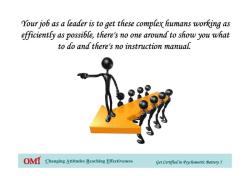What makes effective managers effective?
Effective managers possess a combination of key traits and skills that enable them to lead teams, drive productivity, and achieve organizational goals. Here are some characteristics that contribute to the effectiveness of managers:
Leadership:
- Effective managers are strong leaders who inspire and motivate their teams. They set a positive example, provide clear direction, and foster a collaborative and supportive work environment.
Communication Skills:
- Clear and effective communication is crucial for managers. They need to convey ideas, expectations, and feedback in a way that is easily understood by their team members. Active listening is also an important aspect of effective communication.
Decision-Making Abilities:
- Managers often need to make timely and informed decisions. Effective managers weigh the available options, consider potential outcomes, and make decisions that align with organizational objectives.
Adaptability:
- The business environment is dynamic, and effective managers are adaptable to change. They can adjust their strategies and approaches to navigate evolving circumstances and emerging challenges.
Empathy:
- Understanding and empathizing with the needs and concerns of team members fosters a positive work culture. Effective managers show empathy and consideration, creating a supportive atmosphere within the team.
Problem-Solving Skills:
- Managers encounter various challenges, and the ability to analyze problems and develop viable solutions is essential. Effective managers approach problem-solving methodically and involve their team in finding solutions.
Time Management:
- Prioritizing tasks, setting deadlines, and managing time efficiently are critical for effective managers. They ensure that work is completed in a timely manner and that resources are used efficiently.
Delegation:
- Effective managers understand the importance of delegation. They assign tasks to team members based on their strengths and capabilities, empowering individuals to contribute to the team's success.
Strategic Thinking:
- Effective managers take a strategic approach to their work. They have a clear understanding of the organization's goals and can align their team's efforts to achieve long-term objectives.
Conflict Resolution Skills:
- Conflict can arise in any workplace, and effective managers are skilled in resolving conflicts promptly and constructively. They address issues directly and work towards solutions that benefit the team and the organization.
Team Building:
- Building and maintaining a cohesive team is a key responsibility for managers. Effective managers create a positive team culture, encourage collaboration, and recognize the strengths of each team member.
Commitment to Employee Development:
- Effective managers invest in the growth and development of their team members. They provide opportunities for skill-building, offer constructive feedback, and support career advancement.
Results-Oriented:
- Effective managers focus on achieving results and meeting organizational objectives. They set clear goals, track progress, and adjust strategies to ensure successful outcomes.
Ethical Conduct:
- Demonstrating ethical behavior is crucial for effective managers. They lead with integrity, make decisions based on ethical principles, and serve as role models for their team.
These characteristics collectively contribute to the effectiveness of managers in leading their teams and contributing to the overall success of the organization.
What attributes make effective managers successful in their roles?
Effective managers possess a variety of attributes that contribute to their success. These attributes include:
- Strong leadership skills: Effective managers are able to inspire and motivate their teams to achieve common goals. They are also able to make clear and concise decisions, and to communicate effectively with their team members.
- Excellent organizational skills: Effective managers are able to prioritize tasks, manage time effectively, and delegate responsibilities appropriately. They are also able to create and maintain systems and processes that help their teams to work efficiently and effectively.
- Deep knowledge of the industry and business: Effective managers have a deep understanding of the industry and business in which they operate. This knowledge allows them to make informed decisions and to lead their teams in the right direction.
- Empathy and understanding: Effective managers are able to build strong relationships with their team members. They are also able to empathize with their team members' needs and concerns.
- Commitment to continuous improvement: Effective managers are always looking for ways to improve their own skills and knowledge, and to help their teams to do the same. They are also committed to creating a positive and supportive work environment.
How do effective managers lead and inspire their teams to achieve success?
Effective managers lead and inspire their teams to achieve success in a variety of ways, including:
- Setting clear and achievable goals: Effective managers set clear and achievable goals for their teams. They also break down large goals into smaller, more manageable tasks.
- Providing regular feedback: Effective managers provide their team members with regular feedback on their performance. This feedback is specific, actionable, and timely.
- Creating a positive and supportive work environment: Effective managers create a positive and supportive work environment where team members feel valued and respected. They also foster a culture of collaboration and teamwork.
- Recognizing and rewarding achievements: Effective managers recognize and reward their team members for their achievements. This helps to motivate team members and to create a sense of accomplishment.
- Investing in their team members' development: Effective managers invest in their team members' development by providing them with opportunities to learn and grow. They also encourage team members to take on new challenges and to develop their skills.
Are there common practices or principles shared by highly effective managers?
Yes, there are a number of common practices and principles shared by highly effective managers. These include:
- Being authentic: Effective managers are authentic and genuine. They are true to themselves and to their values.
- Being transparent: Effective managers are transparent with their team members. They share information openly and honestly.
- Being fair: Effective managers are fair and impartial in their dealings with their team members. They treat everyone with respect and dignity.
- Being accountable: Effective managers are accountable for their actions and for the actions of their teams. They take responsibility for their mistakes and learn from them.
- Being adaptable: Effective managers are adaptable to change. They are able to quickly adjust their plans and strategies in response to changing conditions.
By following these practices and principles, effective managers can create a positive and productive work environment where team members can thrive and achieve success.







